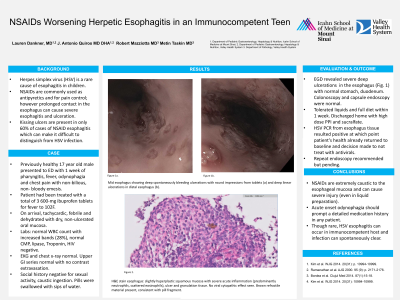Sunday Poster Session
Category: Pediatrics
P1186 - NSAIDs Worsening Herpetic Esophagitis in an Immunocompetent Teen
Sunday, October 22, 2023
3:30 PM - 7:00 PM PT
Location: Exhibit Hall

Has Audio

Jose Quiros, MD
Valley Medical Group, Icahn School of Medicine at Mount Sinai
Paramus, NJ
Presenting Author(s)
Lauren Dankner, MD1, Antonio Quiros, MD1, Robert Mazziotta, MD2, Metin Taskin, MD2
1Valley Medical Group, Icahn School of Medicine at Mount Sinai, Paramus, NJ; 2The Valley Hospital, Ridgewood, NJ
Introduction: Herpes simplex virus is a rare cause of esophagitis in immunosuppressed children and can cause fever, vomiting and odynophagia. NSAIDs are commonly used as antipyretics and can worsen esophagitis by direct prolonged contact within the esophagus, causing kissing ulcers in only 60% of cases, making it difficult to distinguish from HSV endoscopically. We present a case of severe esophagitis caused by HSV and NSAIDs.
Case Description/Methods: A previously healthy 17 year old male presented to the ED with 1 week history of pharyngitis, fever to 102F and severe odynophagia with new chest pain. Non-bloody, non-bilious emesis occurred several times. He was treated with 3-600mg ibuprofen tablets for fever.
In ED: Patient had dry oral mucosa without ulceration, otherwise normal exam, normal CBC, CMP, lipase and Troponin I. Viral swab positive for rhinovirus/enterovirus. EKG normal. Chest X-ray showed no pneumomediastinum. Upper GI series normal.
EGD the following day revealed severe deep esophageal ulcerations, worse distally, with smaller ulcerations proximally. The stomach and duodenum were normal. He was started empirically on high dose IV PPI, IV acyclovir and sucralfate. Patient denied history of sexual activity, other drug or caustic ingestion. He had swallowed the medications with a small amount of water.
Histopathology revealed severe acute inflammation, ulceration and granulation with neutrophils, scattered few eosinophils and no viral cytopathic effect or granulomas. HSV PCR from tissue was positive. Colonoscopy and capsule endoscopy to rule out Crohn’s disease were normal. Patient tolerated a liquid diet after 5 days and was discharged on sucralfate and high dose PPI.
Discussion: Drug induced esophagitis in pediatrics is uncommon and identified in less than 5% of EGDs. NSAIDs are directly caustic to the esophagus via prostaglandin inhibition and responsible for the majority of drug related cases. There is added risk in a dehydrated child who has remained supine for an extended period. HSV esophagitis in immunocompetent children is rare and classically presents with fever, odynophagia with discrete ulcers with raised edges. This is differentiated from the circular kissing ulcers as seen in pill esophagitis. Our case is the first to describe NSAIDs worsening HSV esophagitis. Children with odynophagia and chest pain should have prompt endoscopic evaluation with a thorough OTC drug history and high suspicion for HSV with preceding febrile illness.

Disclosures:
Lauren Dankner, MD1, Antonio Quiros, MD1, Robert Mazziotta, MD2, Metin Taskin, MD2. P1186 - NSAIDs Worsening Herpetic Esophagitis in an Immunocompetent Teen, ACG 2023 Annual Scientific Meeting Abstracts. Vancouver, BC, Canada: American College of Gastroenterology.
1Valley Medical Group, Icahn School of Medicine at Mount Sinai, Paramus, NJ; 2The Valley Hospital, Ridgewood, NJ
Introduction: Herpes simplex virus is a rare cause of esophagitis in immunosuppressed children and can cause fever, vomiting and odynophagia. NSAIDs are commonly used as antipyretics and can worsen esophagitis by direct prolonged contact within the esophagus, causing kissing ulcers in only 60% of cases, making it difficult to distinguish from HSV endoscopically. We present a case of severe esophagitis caused by HSV and NSAIDs.
Case Description/Methods: A previously healthy 17 year old male presented to the ED with 1 week history of pharyngitis, fever to 102F and severe odynophagia with new chest pain. Non-bloody, non-bilious emesis occurred several times. He was treated with 3-600mg ibuprofen tablets for fever.
In ED: Patient had dry oral mucosa without ulceration, otherwise normal exam, normal CBC, CMP, lipase and Troponin I. Viral swab positive for rhinovirus/enterovirus. EKG normal. Chest X-ray showed no pneumomediastinum. Upper GI series normal.
EGD the following day revealed severe deep esophageal ulcerations, worse distally, with smaller ulcerations proximally. The stomach and duodenum were normal. He was started empirically on high dose IV PPI, IV acyclovir and sucralfate. Patient denied history of sexual activity, other drug or caustic ingestion. He had swallowed the medications with a small amount of water.
Histopathology revealed severe acute inflammation, ulceration and granulation with neutrophils, scattered few eosinophils and no viral cytopathic effect or granulomas. HSV PCR from tissue was positive. Colonoscopy and capsule endoscopy to rule out Crohn’s disease were normal. Patient tolerated a liquid diet after 5 days and was discharged on sucralfate and high dose PPI.
Discussion: Drug induced esophagitis in pediatrics is uncommon and identified in less than 5% of EGDs. NSAIDs are directly caustic to the esophagus via prostaglandin inhibition and responsible for the majority of drug related cases. There is added risk in a dehydrated child who has remained supine for an extended period. HSV esophagitis in immunocompetent children is rare and classically presents with fever, odynophagia with discrete ulcers with raised edges. This is differentiated from the circular kissing ulcers as seen in pill esophagitis. Our case is the first to describe NSAIDs worsening HSV esophagitis. Children with odynophagia and chest pain should have prompt endoscopic evaluation with a thorough OTC drug history and high suspicion for HSV with preceding febrile illness.

Figure: EGD Images
Disclosures:
Lauren Dankner indicated no relevant financial relationships.
Antonio Quiros indicated no relevant financial relationships.
Robert Mazziotta indicated no relevant financial relationships.
Metin Taskin indicated no relevant financial relationships.
Lauren Dankner, MD1, Antonio Quiros, MD1, Robert Mazziotta, MD2, Metin Taskin, MD2. P1186 - NSAIDs Worsening Herpetic Esophagitis in an Immunocompetent Teen, ACG 2023 Annual Scientific Meeting Abstracts. Vancouver, BC, Canada: American College of Gastroenterology.
